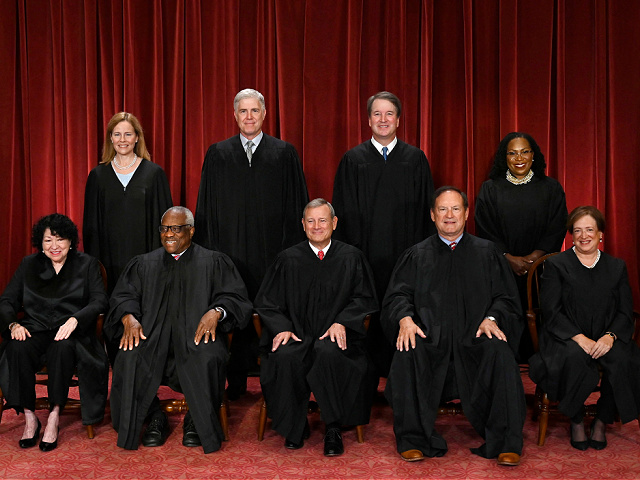
WASHINGTON, DC – Supreme Court justices adopted a Code of Conduct on Monday after years of Senate Democrat attacks, though already Democrats are saying that the ethical code is insufficient, continuing their demands to impose a congressional code that would degrade the Supreme Court as an independent branch of government, making it subordinate to Congress.
As the justices explained in a unanimous statement accompanying the new code:
For the most part these rules and principles are not new: The Court has long had the equivalent of common law ethics rules, that is, a body of rules derived from a variety of sources, including statutory provisions, the code that applies to other members of the federal judiciary, ethics advisory opinions issued by the Judicial Conference Committee on Codes of Conduct, and historic practice. The absence of a Code, however, has led in recent years to the misunderstanding that the Justices of this Court, unlike all other jurists in this country, regard themselves as unrestricted by any ethics rules. To dispel this misunderstanding, we are issuing this Code, which largely represents a codification of principles that we have long regarded as governing our conduct.
This code was issued after a series of attacks by the Left, criticizing justices for practices that liberal justices have engaged in for years without any prominent voices accusing anyone of questionable conduct. It appears to be a strategy of reverse court-packing to disqualify conservative justices from key cases.

Justices of the U.S. Supreme Court pose for their official photo at the Supreme Court in Washington, DC, on October 7, 2022. (Seated from left) Associate Justice Sonia Sotomayor, Associate Justice Clarence Thomas, Chief Justice John Roberts, Associate Justice Samuel Alito, and Associate Justice Elena Kagan, (Standing behind from left) Associate Justice Amy Coney Barrett, Associate Justice Neil Gorsuch, Associate Justice Brett Kavanaugh, and Associate Justice Ketanji Brown Jackson. (OLIVIER DOULIERY/AFP via Getty Images)
“A Justice should respect and comply with the law and act at all times in a manner that promotes public confidence in the integrity and impartiality of the judiciary,” Canon 2 begins. “A Justice should not allow family, social, political, financial, or other relationships to influence official conduct or judgment.”
“A Justice is presumed impartial and has an obligation to sit unless disqualified” from a case, Canon 3(b) begins. “A Justice should disqualify himself or herself in a proceeding in which the Justice’s impartiality might reasonably be questioned, that is, where an unbiased and reasonable person who is aware of all relevant circumstances would doubt that the Justice could fairly discharge his or her duties.”
The code goes on to list situations involving family, friends, and financial interests where such recusals would be appropriate, as well as specific instances that do not rise to that level.
“I doubt this Code will satisfy Senate Democrats and their liberal dark-money backers,” said Carrie Severino, president of the Judicial Crisis Network, “as their campaign has never really been about ethics but rather intimidating a Court that it despises for being faithful to the Constitution.”
In fact, some Democrats are already criticizing the code as not going far enough, noting that it allows the justices to police themselves.
Democrat critics point out that a judicial ethics code binds the judges of lower federal courts, but that criticism misses a key fact: Article III of the Constitution says that Congress can create or abolish lower federal courts, giving Congress a major constitutional hook regarding those courts. However, the Constitution establishes the Supreme Court as a separate branch of government that is coequal with Congress.
Breitbart News senior legal contributor Ken Klukowski is a lawyer who served in the White House and Justice Department.





